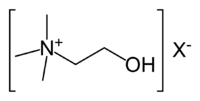Choline
 |
|
 |
|
| Names | |
|---|---|
|
Preferred IUPAC name
2-Hydroxy-N,N,N-trimethylethan-1-aminium
|
|
| Other names
2-Hydroxy-N,N,N-trimethylethanaminium
Bilineurine (2-Hydroxyethyl)trimethylammonium |
|
| Identifiers | |
|
62–49–7 |
|
| 3D model (Jmol) | Interactive image |
| 1736748 | |
| ChEBI |
CHEBI:15354 |
| ChEMBL |
ChEMBL920 |
| ChemSpider |
299 |
| DrugBank |
DB00122 |
| ECHA InfoCard | 100.000.487 |
| EC Number | 200–655–4 |
| 324597 | |
| 4551 | |
| KEGG |
C00114 |
| PubChem | 6209 |
| UNII |
N91BDP6H0X |
|
|
|
|
| Properties | |
| C5H14NO+ | |
| Molar mass | 104.17080 |
| Density | 1.09 g/ml |
| Boiling point | 305 °C (581 °F; 578 K) |
| 500 mg/ml | |
|
Except where otherwise noted, data are given for materials in their standard state (at 25 °C [77 °F], 100 kPa).
|
|
|
|
|
| Infobox references | |
Choline (/ˈkoʊliːn/) is a water-soluble vitamin. The term cholines refers to the class of quaternary ammonium salts containing the N,N,N-trimethylethanolammonium cation (X− on the right denotes an undefined counteranion).
The cation appears in the head groups of phosphatidylcholine and sphingomyelin, two classes of phospholipid that are abundant in cell membranes. Choline is the precursor molecule for the neurotransmitter acetylcholine, which is involved in many functions including memory and muscle control.
Some animals cannot produce choline, but must consume it through their diet to remain healthy. Humans make choline in the liver. Whether dietary or supplemental choline is beneficial or harmful to humans is undefined. Possible dangers include increased risk of cardiovascular disease and cancer, while possible benefits include reducing the risk of neural tube defects and fatty liver disease.
According to the US Institute of Medicine, there is not enough evidence to establish a Recommended Daily Intake for choline. The Australian and New Zealand national nutrition bodies note that while deficiency has been seen during experiments, there have been no reports of choline deficiency in the general population. All three have published an "Adequate Intake" value, discussed below. The European Union's food safety authority says there are no Recommended Daily Intakes in the EU and "no indications of inadequate choline intakes available in the EU".
Methionine and folate are known to interact with choline while homocysteine is undergoing methylation to produce methionine. Recent studies have shown that choline deficiency may have adverse effects, even when sufficient amounts of methionine and folate are present.
...
Wikipedia
